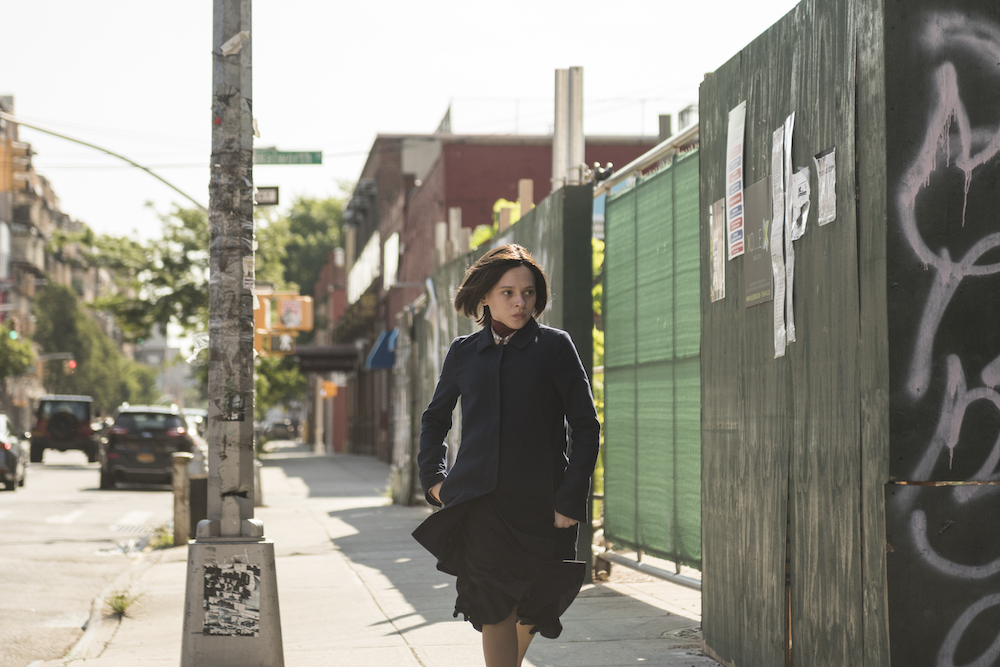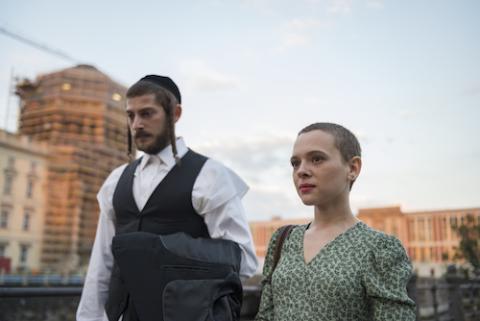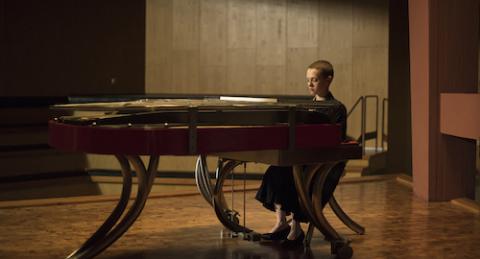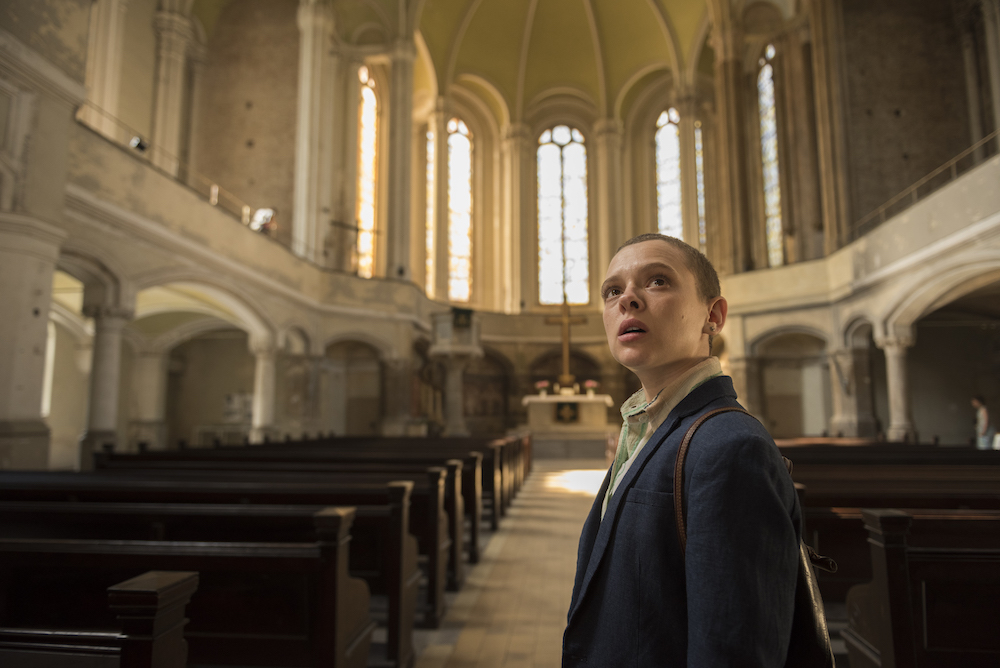
Shira Haas plays Esther Shapiro or "Esty" in Netflix' new series "Unorthodox." (Netflix/Anika Molnar)
In the first episode of "Unorthodox," a new original series from Netflix, Esther Shapiro or "Esty" (Shira Haas) as she is known in her family and ultra-Orthodox Yiddish-speaking Satmar Hasidic community in Williamsburg (Brooklyn), is 19 years old. She is on her way to meet her husband, Yakov, or "Yanky," (Amit Rahav) for Shabbat dinner at her in-laws' house, or so she says. She is carrying a small plastic bag when she meets some young mothers in the lobby of her apartment house. They note that she doesn't need to carry the bag, since it is the eve of Shabbat when no work is allowed after sundown. She returns to her small flat, unpacks the bag and hides the contents in the waistband of her skirt.
Esty leaves apartment with determination and speed, lying about her destination to another acquaintance, before arriving at a house a few blocks away. She hands a woman some money, takes a passport, an envelope and, surprisingly, a small gift. She takes a cab to John F. Kennedy International Airport. There, small and alone, she boards a plane to Berlin.
We then flash back, as this series does throughout, to Esty accompanying her grandfather Mordecai (Gera Sandler) to collect rent on properties he owns. When a piano teacher cannot pay, she offers piano lessons to Esty, who, like her grandmother Babby (Dina Doran), secretly loves music. Babby secretly listens to opera while Esty studies piano for three years.
Along with her grandparents, who are Holocaust survivors, Esty lives with her spinster aunt, Malka (Ronit Asheri). Esty's father, an alcoholic, comes and goes. Her mother, Leah (Alex Reid), a German-born woman who grew up in a Hassidic community in England, is not in the picture.
Aunt Malka tells Esty that a matchmaker has paired her with Yanky. Malka takes Esty to a supermarket where Yanky's mother Miriam (Delia Mayer) and sister observe her on the sly (the market analogy is very interesting). She passes muster — they set up a chaperoned meeting between Esty and Yanky, and the two are engaged. The first thing that Esty tells him, after Yanky speaks first per the custom, is that she is "different from other girls. Normal, but different." Yanky replies, "Different is good," but he does not know what this might mean nor anything about women except that their sole purpose is to have children.

Amit Rahav and Shira Haas star in Netflix's "Unorthodox." (Netflix/Anika Molnar)
After one meeting, Esty and Yanky are married. Esty is genuinely, almost mystically happy, during the feast. Yet problems start right away. The young husband and wife cannot consummate the marriage because the attempts cause Esty so much pain. Worse yet, Yanky gets angry and tells his mother everything and she interferes by giving advice and warnings that humiliate and anger Esty. There must be a child, Miriam insists.
Gossip starts to spread. A Hasidic woman, a kind of religious therapist, speaks kindly to Esty and gives her breathing lessons and "exercises" that cause Esty more pain. No one ever suggests that Esty see a doctor.
Then, after a year, just when things look up for Esty and Yanky regarding a child, Miriam nags Yanky and he asks Esty for a divorce. A few days later, she is gone.
"Unorthodox" is based on Deborah Feldman's 2012 memoir Unorthodox: The Scandalous Rejection of My Hasidic Roots. In the four-part series, as is hinted in the trailer, Esty leaves the community because, as she tells a new group of friends she meets in Berlin, "God expected too much from me."
To her credit, Esty tries to do what is expected of her in this particularly rigid Hasidic community, yet her faults are many. She has read the Talmud, something Yanky rages about. She takes piano lessons and though her husband knows, she quits to make him happy. Finally, she cannot get pregnant; she is not fulfilling her one role as a Jewish woman: to have children to replace the six million that were lost in the Holocaust.
Advertisement
Role definitions in Satmar Hasidism, an ultra-orthodox form of Judaism that originated in Hungary in 1905, dictate that the woman stays home and raises children and pleases her husband. The women must also shave their heads and wear wigs. While married Orthodox Jewish women do cover their hair with a scarf or wig when in public, the obligation to shave a woman's head once she is married is something unique to the Satmar community. Yiddish is their first language. When Esty arrives in Germany, she has no academic education to speak of and no skills for a job.
Some may think "Unorthodox" is a critique of Esty's religious community, its people and practices, and perhaps it is. To me, this is really the story of a young woman who wants more from her life, who bravely seeks a new way, who still loves her family and thinks even though she may be disappointing God, she must find her own direction. Her awkwardness as she sheds the cocoon of her Hasidic life is jarring. It is as if she is tearing off a layer of skin. There are also themes of diversity, community, respect, forgiveness and benevolence in the series, which, at times, can be challenging to watch.
I don't want to give away what happens in Berlin, but in Part Four of the series, Esty sings a Hebrew song, and it was one of those rare transcendent moments in cinema or television that had me in tears. I asked my Hebrew teacher and her husband to translate the first minute of the song. They told me it is a line, repeated four times, from a Jewish wedding song that is usually sung by the man: "Blessed is she who has come. He who understands the speech of the rose among the thorns, the love of a bride who is the joy of the beloved ones." Esty's singing of this religious romantic song reflects her longing for marriage to be more than sexual satisfaction for the husband in order to make children. Esty longs to be cherished, for this song to be sung to her.
And the gift the woman gave Esty when she left Brooklyn? Keep your eye on that.
Look for Haas to gain some award attention for her acting; I could not take my eyes off of her face. She has a rare ability to communicate her inner reality through facial expressions. An actress friend, Illeana Douglas, once told me that you can almost always tell the entire story of the main character through his or her hair. How Haas plays out her relationship with her hair exposes the hope, anxiety, anguish, determination and humanity of this riveting series that I watched twice.
I had the opportunity to speak with Anna Winger, an executive producer and writer for the series.
Pacatte: How did you learn about this story, and why did you want to make it into a series?
Winger: I know the author of the book, Deborah Feldman; our kids go to the same school. I read the book and found that she is so good at explaining and describing not only her home and religious environment growing up, but her interior life, her journey, at the same time. The appeal for me is that the story portrays, in such a moving way, the universal struggle between individuality and community, the rules of faith and interior freedom and looking for one's place in the world.
It seems like most of the actors are Jewish and speak Yiddish. There is a profound feeling of authenticity in the performances.
When we started to produce the series, we brought in a group of people as actors and consultants who had been part of that community and also left it. As I think you can tell, they still have a strong love for where they come from and the faith with which they were raised; they just could not line-up who they were with the practices of the community. It's interesting, but after the publication of Deborah Feldman's book, communication has been re-established between some of those who left the community and their families.
In the short documentary accompanying the film "Making Unorthodox," Eli Rosen's role as the Williamsburg Rabbi Yossele is emphasized.
Eli is an expert in Yiddish, and, as it says in the documentary, "Unorthodox" is the first Netflix production in Yiddish [and English]. Eli, who is from this community, helped us get all the details right, which was very important to all of us. Jeff Wilbusch, who plays Moische, who goes after Esty to bring her home, is also an expert in Yiddish.

Shira Haas stars in Netflix's "Unorthodox." (Netflix/Anika Molnar)
Shira Haas who plays Esty is a complete revelation and a very talented performer.
Shira is an experienced actress from Israel and comes from a mixed family, meaning that she comes from a spectrum of Jews in her extended family. Her grandparents spoke Yiddish, and she learned it phonetically for the film.*
From what I've read in Feldman's book, you've fictionalized many elements of the story.
Yes, the scenes until she flees are close to the book, but after she leaves for Berlin, that is completely made-up.
I did some online research on the book and Deborah Feldman. There is a lot of negativity from the Hassidic community online about the facts of her life as she relates in the book. Also, an Orthodox rabbi friend of mine (not from the Satmar community) said that in his opinion Feldman is not a reliable narrator.
Some members of the community feel a sense of betrayal that she wrote the book, her memoir, in the first place. Every person's story is their own and it is subjective. We focused on Deborah's story, and she has a right to her subjective truth, to what she lived. However, we have deviated so much from her book that the Netflix series is its own fiction.
When you were preparing, did you study any other films about the Hasidic communities in Brooklyn, such as the documentary "One of Us" (2017), and narrative films "A Price Above Rubies" (1998), or "A Stranger Among Us" (1992)? I thought there were thematic similarities with "A Price above Rubies."
I didn't see the other films, but I did see "A Price above Rubies" many years ago. The only film we watched was Rama Burshtein's film "Fill the Void" (2012) because it is about a Hasidic Israeli young woman and marriage. But Esty's story and this series are completely different from these films.
Esty and Yanky are so very unprepared to be married, and his mother is a third person in their marriage.
Esty and Yanky are young and very well-intentioned. But, as happens in some religious communities and cultures, it is an arranged marriage and they do not know themselves or their bodies. This story could be called a romantic tragedy. But more than anything, it is a story of a young woman growing up and becoming her own person and learning to make her own choices freely. This is the story we wanted to tell, one that was universal, one that other people in closed cultural or religions systems could relate to.

Shira Haas plays Esther Shapiro or "Esty" in Netflix' new series "Unorthodox." (Netflix/Anika Molnar)
[Sr. Rose Pacatte, a member of the Daughters of St. Paul, is the founding director of the Pauline Center for Media Studies in Los Angeles.]
*This sentence has been clarified from an earlier version.








